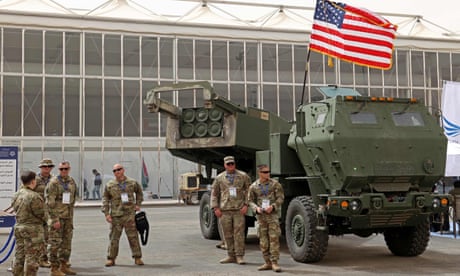- by foxnews
- 11 Mar 2025
Biden’s pledge to send rocket systems to Ukraine is no silver bullet
Biden’s pledge to send rocket systems to Ukraine is no silver bullet
- by theguardian
- 03 Jun 2022
- in news

The US decision to supply Ukraine with high-precision multiple launch rocket systems was marked with some fanfare in Washington including a rare newspaper commentary by Joe Biden himself.
The Himars (High mobility artillery rocket system) and the ammunition that Washington is sending with them, will allow Ukrainian forces to hit targets nearly 80km away with high accuracy. That's twice the range of the US howitzers they have now, and about the same as the most powerful Russian rocket systems. US officials suggested they would help turn the withering artillery duel underway in the Donbas into a fairer fight.
However, the small print of the deal was underwhelming. This first Himars delivery comprises just four systems, and although they have been pre-positioned in the region for fast delivery, it will take three weeks to train Ukrainian gunners to use them, and another two weeks to train maintenance crews.
In the meantime, Russian artillery is blanketing Ukrainian positions in the east. President Volodymyr Zelenskiy said in an interview on Wednesday that up to 100 Ukrainian soldiers are being killed a day and another 500 are wounded. Without stand-off weapons that can target the Russian guns from afar, Ukrainian lines are being pummelled and national morale, one of the decisive factors in the successful defence of Kyiv, is also taking a beating.
Zelenskiy's government has been screaming for multiple launch rockets for weeks, as it became clear that the battle for the east and south had become one of attrition, so why did it take this long for Biden to make the decision to respond?
Amanda Sloat, the senior director for Europe in the National Security Council (NSC) insisted the administration had been as responsive to Ukrainian military needs as possible but timing had been determined in part by a congressional vote to approve a $40bn aid package for Ukraine.
"Once we got the additional funding from Congress, which was provided on a very solid bipartisan basis, the administration moved quickly in response to the Ukrainians latest request," Sloat told PBS television.
The bill was passed by the Senate on 19 May and then was hand-carried by an aide on a commercial flight to Seoul where Biden was on an east Asia trip so he could sign it into law as quickly as possible.
However it took another 10 days to make the critical decision, and judging by the leaks from inside the administration, there was a debate over whether to hand over the Himars and over what kind of range to provide.
The underlying concerns were evident in Biden's op-ed comment piece for the New York Times that coincided with the Himars announcement on Tuesday evening.
The president's emphasis was on setting parameters for the US involvement in the war. It was titled "What America will and will not do in Ukraine", and aimed at diplomatic signalling to contain the risk of an escalation of the conflict into a Russia-Nato war.
"As much as I disagree with Mr Putin, and find his actions an outrage, the United States will not try to bring about his ouster in Moscow," Biden said, as a corrective to his off-the-cuff remark in March that the Russian despot "cannot remain in power".
Furthermore, the Himars come with strings attached. They cannot be fired into Russian territory, and the very long range munitions have been denied to Kyiv, to help ensure that does not happen.
Biden has made clear that he will not allow a catastrophic failure of Ukrainian defences, but it is just as evident he has concerns about the implications of catastrophic success, a rout of Russian forces with the decisive help of western weapons, bringing with it the danger of a defeated Putin lashing out.
Despite the Kremlin's near-incessant nuclear sabre-rattling, Biden reassured Americans that: "We currently see no indication that Russia has intent to use nuclear weapons in Ukraine."
However, Biden's director of national intelligence, Avril Haines, told Congress last month that Putin could reach for the nuclear arsenal if he felt he was losing the war in Ukraine. If he did take that desperate path, Biden warned in his commentary, it "would entail severe consequences".
What the president did not say was that the US would "respond in kind", the phrase he mistakenly used in March in reference to the possibility of a Russian chemical weapons attack.
Few believe that the US would respond with a nuclear weapon to a "demonstration detonation" by the Russians, over the sea for instance. During the Obama administration, the National Security Council conducted a war game in similar circumstances and decided that a non-nuclear response was the best of bad options.
In any case, catastrophic success looks a long way off for the Ukrainians right now as they continue to lose territory slowly, and their soldiers considerably faster.
The weapons the US is sending will staunch the losses but not decisively turn the tables.
"No system is going to turn the war," Colin Kahl, the under secretary of defence for policy, said on Tuesday. "This is a battle of national will. You have ... hundreds of thousands of men mobilised on each side. It is a grinding, hard conflict, and it's likely to be a conflict [which] will stretch on for a long time."
- by foxnews
- descember 09, 2016
High-end vacation resort bans children to achieve 'tranquil environment'
The Alila Marea Beach Resort, located in Encinitas, California, has announced that it's no longer accepting kids and is transitioning to an adults-only vacation spot.
read more


